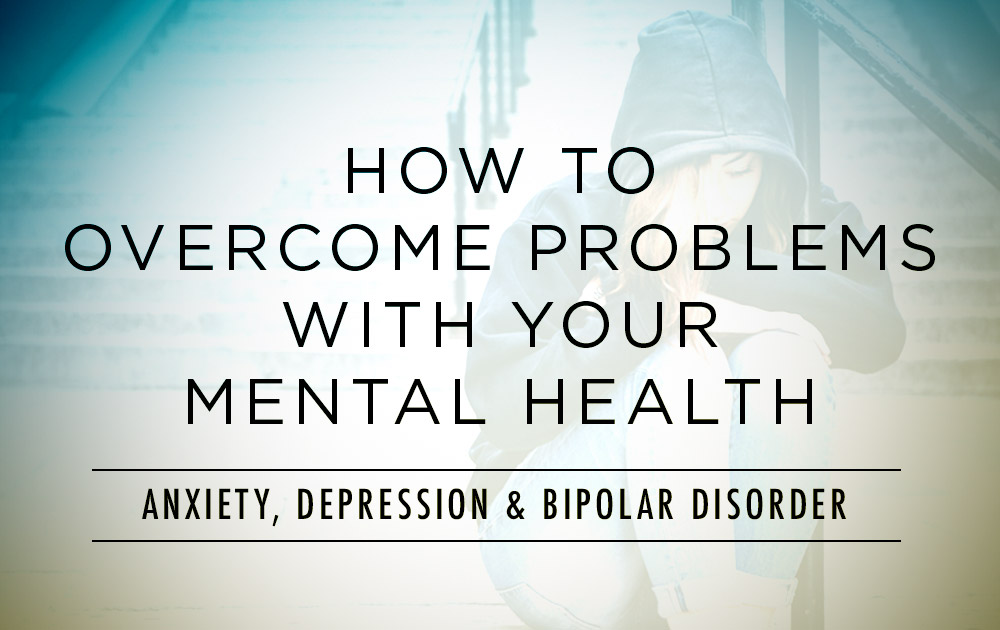by Lucy Miller
While it is normal for people to feel sad and suffer through down periods from time to time, it is not normal for such feelings to linger for extended periods of time. In these instances, individuals might be suffering from a mental disorder. Three common mental conditions are anxiety, depression and bipolar disorder. The following is a brief article describing these conditions, how they affect those suffering from them and ways such illnesses can be treated.
Anxiety
Everyone experiences tense times at one point or another. However, for some people, anxiety can manifest in a number of serious conditions which can make it difficult for those afflicted to carry out routine functions and, in severe instances, engage in simple practices like socializing with others. Common anxiety conditions are generalized anxiety disorder, panic disorder and social anxiety disorder.
A generalized anxiety disorder often causes afflicted individuals to experience symptoms like sleep loss, excessive worry, tiredness and irritability. Those experiencing panic disorders may contend with alarming manifestations such as excessive sweating, a rapid heartbeat, shortness of breath, shaking and dizziness. Social anxiety sufferers are often beset with symptoms of other anxiety disorders. However, in these individuals, attacks occur during or in anticipation of social interactions.
Anxiety conditions typically cannot be linked to any one root cause. That said, it is not uncommon for anxiety to stem from a particularly stressful or traumatic life event. In certain instances, the relatives of anxiety sufferers also have an anxiety or other mental health disorder.
Fortunately, anxiety disorders are treatable. One common treatment strategy is psychotherapy whereby a trained mental health professional works closely with the impacted individual to identify the direct cause(s) of his or her anxiety and create solutions designed to overcome the problem. Other forms of treatment include adopting the practice of stress reduction techniques like exercise and the use of medications such as sedatives, anti-depressants and anti-anxiety drugs.
Depression
Depression, also commonly known as clinical depression, is a feeling of extreme sadness that lasts for months, in some cases, years in afflicted individuals. Depressed people, however, are much more than simply sad. They often experience a severe sense of hopelessness and helplessness that makes engaging in common tasks like attending school, performing at a job, interacting with others and partaking in the activities they used to enjoy extremely challenging.
Other known manifestations of clinical depression include changes in sleep patterns and appetite, weight loss or gain, fatigue, pain, headaches and digestive disorders.
The causes of depression can be difficult to identify because the affliction develops and often increases in severity over an extended period of time. That said, clinical depression has been linked to straightforward issues such as life stressors to more complex problems like chemical imbalances within the brain.
Depression can be treated. Treatment plans often involve the combination of anti-depressant medications and psychotherapy aimed at pinpointing where and when an afflicted person’s depression started.
Bipolar Disorder
Bipolar disorder, also called bipolar depression, is an illness which causes those suffering from it to experience extreme mood swings, ranging from depressive states dominated by feelings of sadness to manic episodes that can be comprised of explosive, high-energy activity.
When a bipolar individual in the midst of a depressive episode, he or she experiences symptoms similar to those seen in clinical depression. However, bipolar disorder also causes those with the illness to experience mania, which can be manifested in symptoms like extreme anger, aggressiveness and impulsiveness. The manic state is considered very dangerous and places bipolar individuals at high risk to engage in reckless behavior.
It may take many years and the close examination of numerous mental health professionals before a diagnosis of bipolar disorder is made. Most often, the condition can successfully be treated with a combination of mood stabilizing, anti-psychotic and antidepressant drugs. Treatment protocols may also include the use of psychotherapy.
So, optimal mental health is crucial for a person’s overall well being. A healthy mental state enables individuals to maintain a positive outlook and tackle the rigors and strains of everyday life.
If you have enjoyed the articles feel free to add any of your thoughts to the comment field below.

Lucy Miller – Guest Blogger
Lucy Miller is a nutrition student, marathon runner, and a passionate writer for Mind Your Zen, a brain nutrition supplement brand. She contributes on a number of blog sharing useful health tips from her research as a nutrition student. She can be reached at lucy@mindyourzen.com





